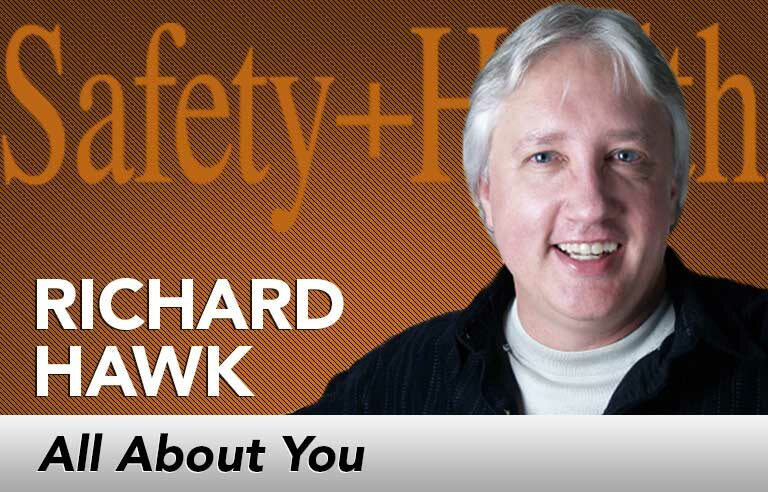All About You: Bad gossip, good gossip

EDITOR’S NOTE: Motivating employees to work safely is part of the safety professional’s job. But who motivates the motivator? In this monthly column, veteran safety pro and professional speaker Richard Hawk offers his entertaining brand of wisdom to inspire safety pros to perform at their best.
“Did you hear what happened to Mary?!” “Can you believe George got that promotion? You know he doesn’t deserve it.” “Carl lost a lot of weight; he looks way different now. I wonder how he did it?”
People love to gossip. I know I do. Talking about others has been a common pastime in every culture throughout the ages. Scientists from Italy’s University of Pavia studied the effect gossiping has on people and found that when we gossip, more of the pleasure hormone oxytocin is released than during any other type of conversation. And other research has shown that gossip is rampant in the workplace.
I’m not going to recommend you refrain from gossiping altogether. Although it has an unfavorable connotation, gossip isn’t always negative. Really, most gossip can be placed into three categories: good, bad and neutral. I’ve found, however, that when I stick to positive or neutral gossip, my mood and relationships improve. Anytime I’ve engaged in bad gossip, it has never improved my life.
A client of mine years ago told me that her grandmother had made a personal vow to never say anything negative about anyone. I got to meet her grandmother and asked her about the vow, which she had made when she was in her 20s. To paraphrase her response: “I realized that saying negative things about other people wasn’t polite. I want to be polite, so I decided not to say bad things about people.” I later asked my client if her grandmother has kept her vow, and she told me she has never heard her grandma say anything disparaging about anyone. And her grandmother has always been part of her life – she even lived with her for a few years.
What bad gossip causes
Division among groups or teams is a common fallout of bad gossip. When we say something negative about someone, it’s often to boost our own position or self-esteem. However, in the process, we can alienate people from the person we’re talking about or the department or group to which he or she belongs. You may have heard the saying, “We judge ourselves by our intentions and others by their actions.” I’ve found this to be true. How about you?
I try to stay aware of my gossiping habits so I don’t fall into the trap of saying something negative about other people. The only exception is when I talk about my close friends and loved ones and kind-heartedly make fun of their actions or habits. But it’s never something they wouldn’t laugh at, too, if they heard what I said.
Why not take stock of your own gossiping for a bit? If you notice you’re engaging in harmful gossip, regularly stopping that habit will make you happier and will improve your social skills.
Benefits of good gossip
Complimenting other people feels good. Research has shown that saying positive things about somebody boosts your mood, and talking about someone’s success or how they overcame an obstacle can stimulate you to improve your own performance. You and I know that when we find out secondhand that we were being talked about in a positive way, it makes us feel good. Often, that feels better than a direct compliment. So why not up your good-gossip meter a bit? It’s an excellent way to inspire yourself and others.
What to do when others gossip?
This can be a tough one. I try to avoid people who are constantly negative if I can, and when bad gossip appears, I either don’t contribute to it or try to change the conversation. I’m not always successful, of course, and I must confess that, unlike my client’s grandmother, at times I find myself engaging in bad gossip. But I’m working on cutting it out of my speech and replacing it with good gossip whenever I can. I encourage you to do the same.
This article represents the views of the author and should not be construed as a National Safety Council endorsement.
Richard Hawk helps safety professionals become better leaders through his keynotes, workshops, articles and books so they can create vibrant safety cultures. His popular “Mindfully Safe” keynote teaches employees how to focus better and improve their situational awareness, a key skill to preventing incidents. To contact Richard, visit makesafetyfun.com.
Direct to your inbox: Sign up to be notified in email about new "All About You" columns.
Listen on Soundcloud or Stitcher
Post a comment to this article
Safety+Health welcomes comments that promote respectful dialogue. Please stay on topic. Comments that contain personal attacks, profanity or abusive language – or those aggressively promoting products or services – will be removed. We reserve the right to determine which comments violate our comment policy. (Anonymous comments are welcome; merely skip the “name” field in the comment box. An email address is required but will not be included with your comment.)

